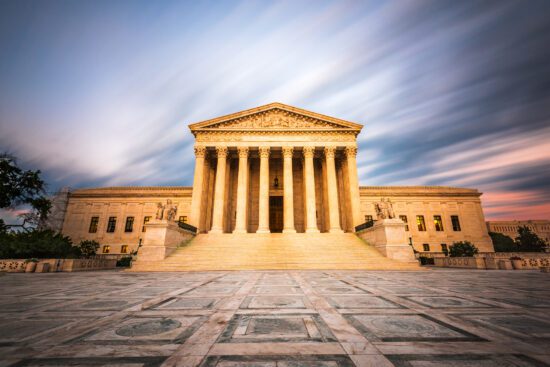On Sunday afternoon, conservative scholar and president of the Ethics and Public Policy Center Ryan T. Anderson received an online message from a would-be reader that his book When Harry Became Sally: Responding to the Transgender Moment was no longer available for purchase on Amazon’s website. The 2018 release from Encounter Books had been pulled by Amazon, without any prior notification to the author or publisher, for violating Amazon’s offensive content policy (though it would not clarify the reason for the move for several days). By Wednesday morning, and after considerable public outcry, the company released a statement about the book being removed from the marketplace. Amazon said it reserved the right not to sell certain products that violated its content guidelines. The statement claimed “All retailers make decisions about what selection they choose to offer and we do not take selection decisions lightly.”
When the book was originally removed by Amazon, search results recommended other works on transgenderism but from a very different ideological perspective, including a work written specifically as a rebuttal to Anderson’s 2018 book. As of this writing, the link is now a “dead link,” or 404 page on Amazon’s website, but the book has yet to be relisted. In the book, Anderson seeks to answer many of the questions that arise from the transgender movement and seeks to offer a scientific, philosophical, and ethical look at how transgenderism is seeking to rewrite human nature and reject biological realities.
In an essay about Amazon’s action to remove the book, Anderson noted that the book was praised by “the former psychiatrist-in-chief at Johns Hopkins Hospital, a longtime psychology professor at NYU, a professor of medical ethics at Columbia Medical School, a professor of psychological and brain sciences at Boston University, a professor of neurobiology at the University of Utah, a distinguished professor at Harvard Law School, an eminent legal philosopher at Oxford, and a professor of jurisprudence at Princeton.”
While there are many questions still unanswered about why this book was removed and why the decision was made three years after the book’s initial publication (and multiple reprints), one thing remains abundantly clear: a private company that sells nearly three out of every four books is using its outsized influence to shift the public conversation on a critical issue. There is little doubt that Amazon’s decision to silently remove the book from its cyber shelves was intentional. In the short term, this move will only help Anderson’s work on transgenderism gain a wider audience. But in the long term, it will have a chilling effect on the free exchange of ideas in our society. It is also likely to silence voices who dissent from the progressive agenda of the sexual revolution.
Conflicting content guidelines
Amazon, like many technology companies, including popular social media platforms, has a set of content guidelines about what it will allow on its platform. The guidelines begin by saying that “As a bookseller, we believe that providing access to the written word is important, including content that may be considered objectionable.” This is a laudable practice for a book retailer, especially for a company that began in 1994 with the goal of selling books online across the nation. Broad access to the written word allows for the free exchange of ideas and ultimately strengthens the social fabric of our nation as we openly debate important issues and engage ideas contrary to our own, even those ideas we find controversial or disagreeable.
But further down in their content guidelines, Amazon clearly walks this statement back. Apparently, “content that may be considered objectionable” does not include specific types of objectionable content. Amazon goes on to state, “We don’t sell certain content including content that we determine is hate speech, promotes the abuse or sexual exploitation of children, contains pornography, glorifies rape or pedophilia, advocates terrorism, or other material we deem inappropriate or offensive.” On balance, most of these exceptions appear to be reasonable and beneficial to society as a whole. However, “other material we deem inappropriate or offensive” is a vague and expansive statement that completely undermines the earlier goal of tolerance for opposing viewpoints.
This exception purportedly gives license for Amazon to remove any number of items from the marketplace, including three-year-old high selling titles that present a contrary viewpoint to the reigning secular opinions about human sexuality. Anderson’s book is now completely unavailable on Amazon, even to those who might want to engage the work in order to debunk his arguments or present an alternative viewpoint consistent with the tenets of the sexual revolution. All of this from a company that itself profited from the sales of the work for over three years and still allows other “intolerable” works that denigrate entire groups of people, including people of faith, for their view of human sexuality and human flourishing.
A better vision for the public square
Recently, many questions have arisen concerning the actions of these nascent technological marketplaces and social media companies to regulate content on their platforms. These questions include concerns about the stifling of free speech, the role of government in regulating private corporations like Amazon, Facebook, and Twitter, and the extent to which such companies are free to determine and enforce these policies on their own.
At present, Amazon’s removal of Anderson’s book from the marketplace does not technically involve issues of free speech under the First Amendment. And it is important to note that Anderson’s work is currently sold by other online retailers such as Barnes and Noble, independent bookstores, and even on his publisher’s website. But Amazon’s removal of a popular book under this overly broad—and easily abused—“inappropriate or offensive” policy is deeply distressing. It also raises pressing questions Christians must answer as we seek to build out a public theology for this technological age.
Digital content moderation or removal often leads to claims that a person’s freedom of speech or even freedom of religion is being violated. But this view fails to recognize that the First Amendment specifically protects individuals from the overreaching hands of government, not from content policies of private companies (no matter how errant or ill-advised such policies might be). Again, in this case there is no doubt that Amazon sought to wield its influence to shape public opinion on a critical matter of public concern by silencing dissenting voices. And given Amazon’s size and influence, it is possible that actions like this could result in inquiries about antitrust or lead to federal oversight, which could override Amazon’s ability to set its own content policies.
In our view, Amazon is completely wrong for removing this book from the marketplace. Not only did Amazon violate its own stated policy of including content it deems objectionable, but it did so to deny users access to a countervailing argument to the ideology it deems in vogue. No one needs to be protected from a robust and informed public debate. As Alan Jacobs puts it, “Amazon clearly believe(s) there is only one reason to read a book. You read a book because you agree with it and want it to confirm what you already believe.” In this age of tolerance and inclusion, it is abundantly clear that only certain “acceptable” ideas will be tolerated, which is actually no form of tolerance at all.
Time will tell if Amazon decides to reverse course and restore the book. Regardless of this particular outcome, it is obvious that we are living in a new era of human history—one in which powerful and often unrivaled technology companies wield enormous amounts of power over our public discourse. As Christians, the proper response is not fear or panic but to engage with convictional kindness, even as we work to maintain an open digital public square. We can engage these pressing concerns from a place of steadfast hope and confidence knowing that while our beliefs may not always be popular or fashionable, our beliefs reflect reality and ultimately lead to human flourishing.











